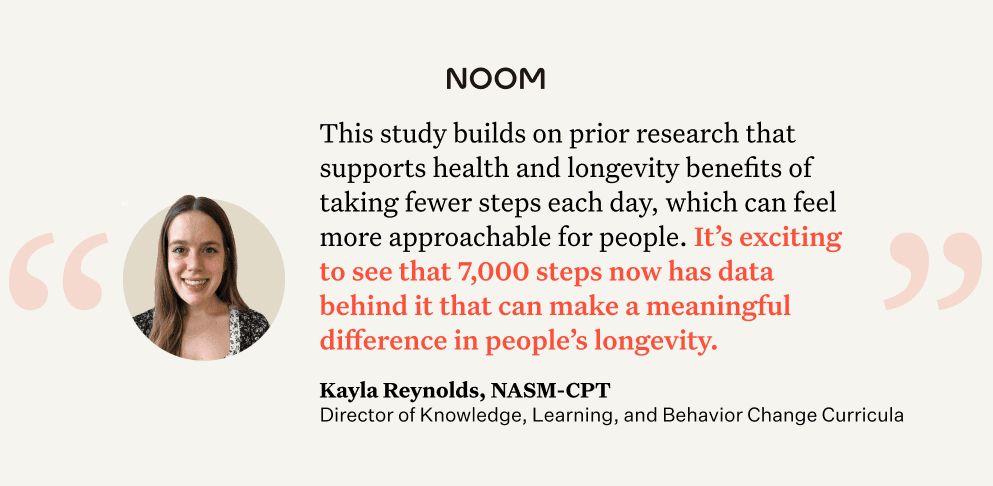From Apple watches and Fitbits to the old-fashioned pedometer, step count has been a popular way to track health goals. Most people aim for 10,000 steps per day, but is that number really necessary to reap the benefits? Maybe not.
A new study in The Lancet Public Health offers a new perspective, suggesting that we don’t actually need to reach 10,000 steps a day. This large review of 57 different studies found that walking closer to 7,000 steps per day is linked to significant health benefits. It’s also a more realistic goal than the often-cited 10,000 steps, especially for people who aren’t very active.
Getting 7,000 steps a day can deliver health benefits
This study aimed to explore the relationship between step count and various health outcomes, including heart disease, cancer, type 2 diabetes, and depressive symptoms.
Surprisingly, results showed that meaningful improvements start to level off around 7,000 steps per day as opposed to 10,000. While some benefits increase beyond this point, they do so at a slower rate.

Here’s why:
- Every step counts: The American Heart Association recommends at least 150 minutes of moderate-intensity aerobic activity each week—about 30 minutes a day, five days a week. That’s roughly 3,000 steps a day, but even small amounts of movement contribute to better health.
- 7,000 steps is a great target: Walking 7,000 steps a day significantly lowers the risk of many major health problems compared to walking only 2,000 steps a day.
- More steps are still better: While the health benefits continued to increase as people walked closer to 10,000 and 12,000 steps a day, the gains started to level off at around 7,000 and improved only incrementally after that.
“The 10,000 steps per day goal actually originated from a Japanese marketing campaign for a pedometer, rather than any landmark studies,” says Kayla Reynolds, NASM, CPT, Director of Knowledge, Learning, & Behavior at Noom.
“While it’s a worthy goal to work towards, this study builds on prior research that supports health and longevity benefits of taking fewer steps each day, which can feel more approachable for people. It’s exciting to see that 7,000 steps now has data behind it that can make a meaningful difference in people’s longevity,” she adds.
So, what happens to your body when you walk 7,000 steps each day? Let’s look at the specific outcomes.
Health improvements linked to 7,000 steps per day
Getting 7,000 steps was shown to reduce the risk of many common health problems. Compared to walking only 2,000 steps a day, walking 7,000 steps a day was associated with a reduced risk of:
- All-cause mortality: 47% lower risk of death from any cause.
- Cardiovascular disease: 25% lower risk of developing heart disease and a 47% lower risk of dying from it.
- Dementia: 38% lower risk.
- Cancer: 37% lower risk of dying from cancer.
- Type 2 diabetes: 14% lower risk.
- Depressive symptoms: 22% lower risk.
- Falls: 28% lower risk.
The study also found that for some outcomes, like death from any cause and developing heart disease, the biggest benefits happen when you go from a very low step count to about 4,000 to 7,000 steps.
“This study shows that it’s not all or nothing when it comes to movement,” adds Reynolds. “Every step counts—just going from 2,000 to 4,000 steps per day was linked to a 36% lower risk of death from any cause.”
Can 7,000 steps a day help with weight loss?
Getting more steps in can definitely be a part of a weight-loss plan, but it works best when combined with other healthy habits. Walking, like any other form of movement, helps you burn calories to create a calorie deficit, which is key to losing weight.
Movement is only one of many aspects that influence weight loss. Pairing regular movement with balanced meals can help you maintain a deficit. Creating habits that help you reach your goals and stick with them long term is most important.
The bottom line: 7,000 steps a day is a good target
The bottom line is that 10,000 steps may not be necessary for better health. Working up to 7,000 steps a day is a realistic target for improving overall health and preventing chronic diseases.
For people who want to lose weight, focusing on increasing step count, along with building other healthy habits like eating a well-balanced diet, getting quality sleep, and managing stress, is key. That’s where Noom comes in. Our science-backed program helps you build these habits step-by-step, using proven behavior-change techniques, tracking tools, and personalized coaching to keep you on track for long-term changes.
Editorial standards
At Noom, we’re committed to providing health information that’s grounded in reliable science and expert review. Our content is created with the support of qualified professionals and based on well-established research from trusted medical and scientific organizations. Learn more about the experts behind our content on our Health Expert Team page.

















